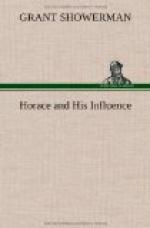“O_h, what can match the green recess_,
W_hose honey not to Hybla
yields_,
W_hose olives vie with those that bless_
V_enafrum’s fields_?
“L_ong springs, mild winters glad
that spot_
B_y Jove’s good grace,
and Aulon, dear_
T_o fruitful Bacchus, envies not_
F_alernian cheer_.
“T_hat spot, those happy heights
desire_
O_ur sojourn; there, when
life shall end_,
Y_our tear shall dew my yet warm pyre_,
Y_our bard and friend_.”
And what numbers of men have taken to their hearts from the same ode the famous
Ille terrarum mihi praeter omnes
Angulus ridet,—
Y_onder little nook of earth_
B_eyond all others smiles on me_,—
and expressed through its perfect phrase the love they bear their own beloved nook of earth. “Happy Horace!” writes Sainte-Beuve on the margin of his edition, “what a fortune has been his! Why, because he once expressed in a few charming verses his fondness for the life of the country and described his favorite corner of earth, the lines composed for his own pleasure and for the friend to whom he addressed them have laid hold on the memory of all men and have become so firmly lodged there that one can conceive no others, and finds only those when he feels the need of praising his own beloved retreat!”
To speak of sterner virtues, what a source of inspiration to righteousness and constancy men have found in the apt and undying phrases of Horace! “Cornelius de Witt, when confronting the murderous mob; Condorcet, perishing in the straw of his filthy cell; Herrick, at his far-away old British revels; Leo, during his last days at the Vatican, and a thousand others,” strengthened their resolution by repeating Iustum et tenacem:
“T_he man of firm and noble soul_
N_o factious clamors can control_
N_o threat’ning tyrant’s
darkling brow_
C_an swerve him
from his just intent_....
A_y, and the red right arm
of Jove_,
H_urtling his lightnings from
above_,
W_ith all his terrors then
unfurl’d_,
H_e would unmoved,
unawed behold_:
T_he flames of an expiring
world_
A_gain in crashing
chaos roll’d_,
I_n vast promiscuous ruin
hurl’d_,
M_ust light his glorious funeral
pile_:
S_till dauntless midst the wreck of earth
he’d smile_.”
Of this passage Stemplinger records thirty-one imitations. How many have had their patriotism strengthened by Dulce et decorum est pro patria mori, the verse which is aptly found in modern Rome on the monument to those who fell at Dogali. How many have been supported and comforted in calamity and sorrow by the poet’s immortal words of consolation on the death of Quintilius:
Durum: sed levius fit patientia
Quicquid corrigere est nefas,—
A_h, hard it is! but patience lends_
S_trength to endure what Heaven sends_.




